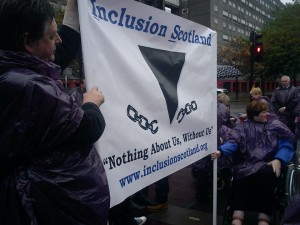
Inclusion Scotland Glasgow People 1st Demonstration 1st October 2011
Campaigners have warned disabled people considering a move to Scotland in the wake of the European Union (EU) referendum vote that there are considerable barriers standing in their way.
The warnings came after Disability News Service reported last week that hundreds or even thousands of disabled people, particularly from England, were apparently considering a move north of the border because they felt their rights would be better protected there.
With the UK set to leave the EU, the Scottish government looks likely to push for another referendum on independence, and would hope to rejoin the EU as an independent nation, which would mean disabled people would retain the safeguards provided by EU legislation.
But Dr Sarah Campbell, principal co-author of the Spartacus Report, warned of a “huge flaw” in the care system in Scotland that does not apply in England and Wales.
She pointed out that local councils in Scotland can take into account the earned income of working-age disabled people when deciding how much they should pay towards their care package.
This can mean that a disabled person in full-time work, but with a high number of hours in their council care package, can end up not much better off than someone on out-of-work disability benefits.
Campbell said: “Because there is a general view that care is ‘free’ in Scotland, most people are completely unaware of this and I am pretty concerned some disabled people may get caught out.”
Although guidance from the Convention of Scottish Local Authorities (COSLA) makes it clear that “income from all sources should be considered and should take account of net earnings and all social security benefits with the exception of the mobility component of the Disability Living Allowance/Personal Independence Payment”, councils can ignore this advice.
Bill Scott, director of policy for Inclusion Scotland, said this “results in a postcode lottery that often deters disabled people from moving home from one local authority area to another – even when they have an offer of a job or when informal care arrangements break down”.
Two Scottish councils do not charge working-age disabled people for care at all, while others charge much more than the average, which he said had helped persuade most Scottish disabled people’s organisations to call for care charges to be scrapped completely.
He said: “I have severe doubts as to whether ‘thousands’ of disabled people would be able to make the move from England to Scotland because in doing so many would lose the informal networks of care and support that allow them to participate in society.
“There is also a dearth of fully adapted accessible homes in Scotland, just as there is in other parts of the UK.”
He added: “So whereas I can see the numerous attractions in moving to Scotland – better benefits, no bedroom tax, a nationwide concessionary travel scheme, more respect for disabled people’s human rights and not forgetting the beautiful scenery! – I think that there would be huge practical and emotional barriers, including abandoning family and friends, that would prevent many disabled people from doing it.”
A COSLA spokeswoman said*: “COSLA and all local authorities in Scotland are positive about disability and are committed to supporting disabled people’s rights.
“Generally speaking, and bearing in mind that every individual is different, we would not anticipate any greater problems for people choosing to move to Scotland than they would face moving from one part of England to another.
“They would require both a needs assessment and a financial assessment to be carried out by the council in the area to which they are moving.
“It is worth bearing in mind that, in order to accommodate different council areas’ priorities and circumstances, there may be some differences in the specification of the care package they are able to receive.
“Income is assessed as part of the financial assessment undertaken by councils in Scotland just as, we understand, it is in councils in England.
“In Scotland, councils use charging guidance which is based on the principle that people are required to contribute toward the cost only if they can afford to do so.
“There are a number of benefits that may be disregarded from the financial assessment such as DLA mobility component and some expenditure is also allowed for, for example, disability-related expenditure.
“There are minimum levels of income below which people are not required to pay for the care they receive.
“These thresholds are linked to DWP benefits but apply to any income regardless of the source.
“There is also a ‘buffer’ which means that those with income above the charging threshold will keep at least 25 per cent more than people who are receiving only ‘out-of-work’ benefits’; COSLA’s member councils agreed to increase this from 16.5 per cent to 25 per cent starting this financial year.”
Some disabled people accused Disability News Service of “scaremongering” by running last week’s story.
But others who commented said they too were thinking of moving to Scotland, with one saying: “I am looking at houses for sale north of the border (this was a retirement plan anyway) and plan to live in a country that wants to be part of a community, not one which supports the very ethos of individualism.”
Another said: “I know someone who is in the process of moving right now. If we didn’t have elderly relatives who need us we’d be doing the same.
“Funny how reporting what’s happening is called scaremongering.”
*The COSLA statement has been reproduced in full

No responses yet